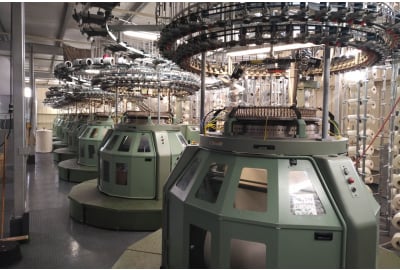
One of the key factors in our ability to manufacture the highest quality gear that performs in the most punishing environments is our tight supply chain here at Massif. We maintain that control using our extremely close relationship with our parent company Antex Knitting Mills— we develop and manufacture most of the fabrics that we use for Massif gear in their Los Angeles, CA based mill.
Building completely vertically integrated products here in the United States is integral to Massif’s success. Not only does it speak to our commitment to keeping close tabs on everything we make, but it also allows us to follow strict Berry Amendment Compliance which is a non-negotiable piece of serving members of the US military. While manufacturing here in the US is an inextricable part of our business, running a successful mill and dye house in the United States right now is not easy.
When the Tenenblatt family founded Antex Knitting Mills in 1973, more than 95 -percent of garments that were sold in the US were made in the US. Today, that number is somewhere around 4 percent. Antex Knitting Mills was able to not only survive but thrive in the midst of dramatic changes in their market because of keen business acumen, taking some smart chances on little guys, taking care of their employees, and a great deal of hard work.

Bill Tenenblatt and his family worked remarkably hard to build the company from scratch after immigrating to Los Angeles from Romania. Tenenblatt and his parents spent every free moment working to save up enough money to purchase the eight used knitting machines with which they started the company. They have grown to become the largest mill and dye-house in Los Angeles, but they still maintain the same close watchful eye over the quality of the fabrics they produce that they did when the company was in its infancy.
Part of their initial success was geographic. “Los Angeles had a lot of vitality,” said Bill Tenenblatt. “We were lucky because we started in the right place. California at that time was a big manufacturing center. It had a lot of open land and buildings and good transportation and a very good labor force.” On top of the solid infrastructure in Los Angeles, it was also a fashion hub. “California was the right place because textiles and garments are connected to fashion, and fashion is connected to the movie industry, so there were a lot of good designers and flamboyant people that started doing their own styles and fashion. If you were lucky and it caught on, there was room to grow.”

Over the course of Antex Knitting Mills’s first 27 years, they built a niche and grew even as manufacturing in the US began to slow down. On top of being able to consistently deliver the highest quality products to their customers, Bill credits his father’s uncanny ability to spot growth potential in customers pitching small orders. “We would make sure that the person coming in the door has potential, but it could be a small customer. It could be a guy who wants to buy 500 yards ,and we are producing tens of thousands of yards a day. Most of the time we’d look at him—my dad didn’t have a lot of education but had a lot of street smarts—he’d look at the person and listen to him for a while and make a quick judgment if the person had potential or not. He would kind of nod his head either yes or no to me, like sideways, and I’d know whether we’d work with the person or not,” Bill said. “Even if it was a sample that was five yards and a pain to make because you had to disrupt the whole line, we’d do it. Many times some of these guys would hit. They’d have some skill and they would sell and they’d have decent companies and grow. It was amazing. This business is a lot of hard work, but part of it is being nimble and finding opportunities.”

One of those opportunities for growth came when Chris Wasgatt, Massif’s previous Executive Vice President walked into Antex’s offices with a plan to revolutionize FR materials for SAR and military gear. Chris’ incredibly high energy level and natural salesmanship caught the Tenenblatts’ eye and led them to take a chance on him and Massif, even though the FR materials he was pitching them to build were incredibly labor intensive and his first orders were specks compared to the size of orders they were filling at the time. The chance they took on him paid off, especially as US manufacturing continued to take a precipitous fall through the early aughts.
Antex Knitting Mills has been able to stay remarkably strong during the last 20 -years when US textile manufacturing shrunk tremendously for a variety of reasons, and their relationship with Massif is an important part of that strength. “The question always comes up: how are we still in business manufacturing anything in Los Angeles? Let alone textiles,” says Daniel Tenenblatt, President of Massif and Vice President of Antex Knitting Mills. “There are a couple of factors. One is that we have a fantastic R&D team, which is unusual in LA and also in this region. That is how we have come up with a lot of the Massif fabrics, a lot of the flame retardant fabrics, and a lot of the unique chemistries we are using for a lot of different applications.”

Antex Knitting Mills’s ability to create state of the art FR fabrics for Massif right here in the US helps us maintain the highest level of quality and strict Berry Amendment Compliance that set us apart from our competitors. We are thankful for this relationship, the hard work of the Tenenblatts, and their willingness to take a chance on small but important projects.






